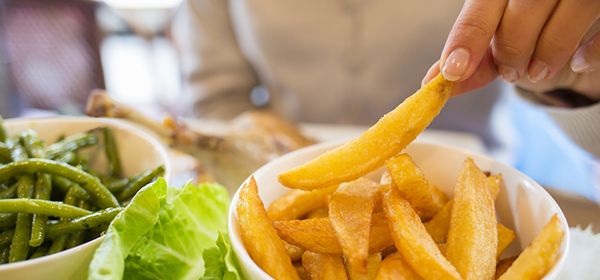What is the link between French fries, breast milk and obesity?
Let me explain.
A Yale University-led study has found that when fat and carbohydrates are combined in a single food, the brain considers them more rewarding than foods with either one of those energy sources.
Fatty foods, such as cheese, trigger one pathway of signals to the brain, while carb-loaded foods, such as grain or a lollipop, take another route. Dana Small, professor of psychiatry at Yale and senior author of the paper, says: “Our study shows that when the signals are combined, they make foods more reinforcing.”
What makes this finding even more interesting, she says, is that foods high in fat and carbohydrates don’t exist in nature – with one exception, breast milk.
“This makes sense,” says Prof. Small. “Since it is important for infants to learn to suckle in order to survive.”
So where does obesity come into play?
“In the modern food environment that is rife with processed foods high in fat and carbohydrates like doughnuts, French fries, chocolate bars and potato chips, this reward potentiation may backfire to promote overeating and obesity,” she says.
So every day, you are fighting your brain to avoid reaching for French fries instead of fresh fruit, a doughnut instead of wholegrain bread. And if you cave into the craving, you may be on the way to an addiction.
Prof. Small’s team wired 206 people to brain scanners, and then showed them images of fatty, sugary and ‘combo’ snacks.
When an image of a snack that was high in both fat and carbohydrates was shown on a screen, the reward centres in the subjects’ brains lit up “like fairy lights on Christmas Eve”.
Prof. Small said it made no difference whether the participants’ said they liked those foods or not, the brain still craved them.
“Our study shows that when both nutrients are combined, the brain seems to overestimate the energetic value of the food,” she says.
Another region of the brain lit up – the striatum, which is the region linked to addiction.
“What they are showing is there is a distinction between liking something and wanting something – and this comes from the addiction literature,” says Professor Boakes, an obesity scientist at the University of Sydney.
“Smoking is a good example. People can crave a cigarette, even if they don’t like it. And this research is saying food craving is particularly strong for the combination of fat and carbohydrate.”
So are we fighting a losing battle? Should we just settle for hot chips and a doughnut? Just joking.
Have you noticed a craving for fatty high-carbohydrate foods? Does this study explain why?
Related articles:
Our binges cost millions
What your food cravings mean
Oven-baked fish and chips

